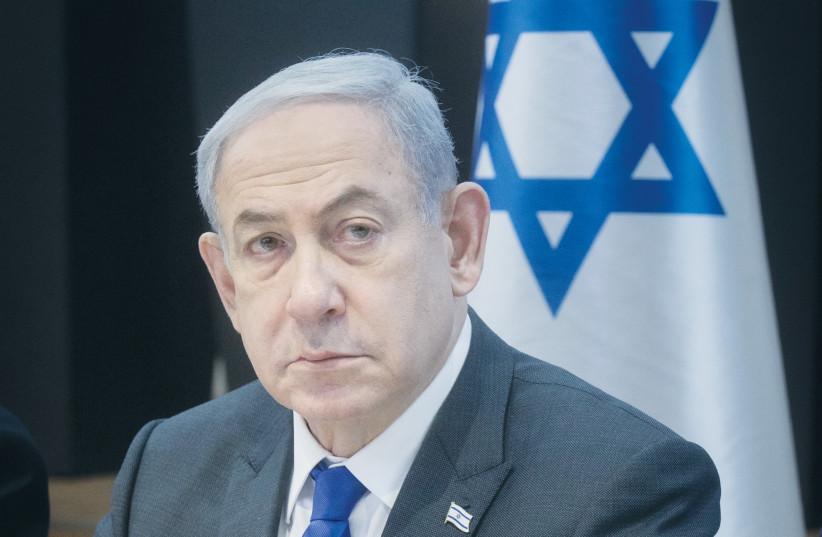Whoever explains Prime Minister Benjamin Netanyahu’s ideological credo as merely an expression of opportunism is taking his job too lightly. In the long course of his reign, Netanyahu has defended his ideological positions with determination and managed to maneuver through a thicket of daunting pressures and constraints. During his presidency, Shimon Peres miscalculated when he tried to steer Netanyahu toward a two-state solution. Peres wrongly assumed that Netanyahu would be tempted by a peace accord that would gloriously enshrine his name in history. In the battle of the minds between the two, Netanyahu won.
An unflinching examination of Netanyahu’s political conduct shows that he worked tirelessly to put off a decision on the future of the West Bank. This approach assumes that time is on Israel’s side, and that a better geopolitical reality would emerge down the road and provide Israel with an optimal outcome: maximal territory with minimal Palestinians.
One potential avenue in such a new reality is signing a permanent agreement on the future of the territories with an existing country – Jordan. In this eventuality, negotiations would entail settling a territorial dispute, thus avoiding the explosive issue of Palestinian self-determination. Transferring responsibility for the fate of the Palestinians to the Hashemite kingdom has cropped up in various iterations over the years. An alternative idea envisioned Palestinian rule in Jordan. At the beginning of his career, Netanyahu enthusiastically promoted the slogan “Jordan is Palestine.” Even though today this is considered diplomatically incorrect, suspicions remain in the Hashemite Royal Court that there are Israelis who have not abandoned the idea.
To buy Israel time to continue holding onto the territories, Netanyahu embraced a “strategic patience” approach. It induced him to act cunningly and deceive friends and foes alike. His lip service to the “peace process” was a cardboard façade. The logic of his approach also led him to weaken the Palestinian side and then cynically proclaim that it was not sufficiently ripe for partnership.
Netanyahu skillfully maneuvered between strong forces pulling in opposite directions. To protect the territories, he torpedoed moves that could lead to the establishment of a Palestinian state. At the same time, the prime minister had to rein in the proponents of a “Greater Israel.” He knew that the world would not countenance unilateral annexation and would push to accelerate resolution of the conflict. Thus, the fate of the West Bank would have been finalized prematurely, long before the emergence of favorable geopolitical conditions.

But now that Netanyahu’s political power has eroded, he can no longer disguise his true intentions. His dependence on Ben-Gvir and his ilk enables them to exploit his weakness. While they allow Netanyahu to sit in the prime minister’s office and deal with his legal entanglements from an advantaged perch, they also deny him diplomatic flexibility and forbid him to even hint at a territorial compromise with the Palestinians.
Ben-Gvir brings Netanyahu's true intentions to light
Under Ben-Gvir’s duress, Netanyahu can no longer camouflage his intentions. He is compelled to unequivocally retract his false promises from the past, and can no longer feign commitment to the two-state formula. The prime minister withstood the heat for many years, but now that he is captive to the messianic Right, his genius for concealing the ideology that guides him is collapsing.
The war in Gaza puts into stark relief the inherent potential of the Israeli-Palestinian conflict to spark a regional conflagration, perhaps even involving the great powers, and has consequently intensified international clamor for its resolution. The Israeli government’s diplomatic rigidity prompts the world to consider enforcing a solution from the outside. And thus, the cunning of history turns the extreme Right into an instrumental player – in complete contradiction to its ideology and goals – in bringing Israel closer to the two-state solution.
The pompous government statements decrying unilateral recognition of a Palestinian state and international attempts to dictate a settlement are as effective as the whistle of a frightened person desperate to dispel the darkness.
Now that Ben-Gvir has unmasked Netanyahu’s ideological intransigence, what option do the two leave for a very concerned world other than dictating how to end the Israeli-Palestinian conflict?
The writer is a former director-general of the Foreign Ministry, a senior fellow at the Jewish People Policy Institute (JPPI), and has recently authored a children’s book titled 'Guy and the Game of Chess.'
